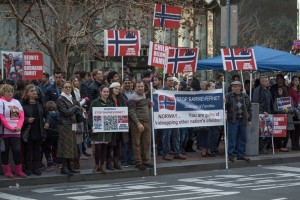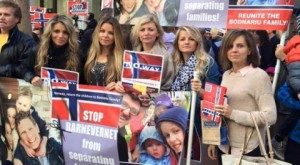Norwegian politicians: The horror around “Child Protection”
Norwegian politicians: The horror around “Child Protection”
By John Volosen
Houston, Texas
I was really happy to find out that FINALLY, some Norwegian politicians have awakened, and they are in total agreement with some of the arguments we brought forth from the beginning of the Bodnariu case, and those are that:
-
the biological principal (parental principle) must weight heavily in the decision
- if placement is really required, then children must first be placed to relative family
- there are cases where the interrogators obtain false confessions from the children
- the decisions to remove the children is mostly based on the psychological reports written by Barnevernet hired psychologists.
-
there are no checks and balances on the decision power of Barnevernet. There is no independent institution to verify the validity of these measures.
[Romanian: In sfarsit unii din politicienii Norvegieni s-au desteptat si agreeaza intocmai cu punctele pe care noi le mentionam inca de la inceptu, si anume:
- principiul biologic (parental) trebuie sa aiba valoare si sa cantareasca greu in decizia Barnevernet-ului
- daca chiar este nevoie, plasarea trebuie facuta in primul rand la familia apropiata,
- uneori interogatorii obtin marturii false de la copii,
- toate decizile se i-au be baza rapoartelor intocmite de psihologilor angajati de Barnevernet,
- puterea de decizie a Barnevernet-ului nu este verificata de institutii independente. Ma bucura acest articol, inseamna ca totusi nu vorbim prostii.]
–original source: http://www.aftenbladet.no/meninger/…
–authors: Susanne Heart, Daria Maria Johnsen City Council Representatives of the Green Party in Stavanger
–translated using Google-Translate with additional grammatical corrections by John V. (please visit original link for Norwegian article, or revisit the translation link for any post publication corrections: https://www.facebook.com/notes/ionu…)
 It is said that no one is deprived of the care of their children without reason. But is it always so? As elected representatives of the Green Party we require that a process be initiated immediately at both the local and national level to restructure the child welfare services in Norway.
It is said that no one is deprived of the care of their children without reason. But is it always so? As elected representatives of the Green Party we require that a process be initiated immediately at both the local and national level to restructure the child welfare services in Norway.
We need to get a grasp on „Ida” and other youth horror stories of child welfare services that produce terrible pain. It is painful to hear the parents’ desperate struggle to get their children back. The child protection system, as shown in the media, is characterized by fear and fighting more than care and love. Emotional ties are strong, regardless of the circumstances behind them. Barnevernet makes an important and often thankless job. A job that is being criticized of doing both too little and too much intervention in our private sphere. Where does it go wrong? We would like to explain why we want a fundamental debate in order to amend the Child Welfare Act and the system around it.
Trauma is being created every day by ordinary people like you and I, in a world most of us never knew existed. It was decided that Ida could not remain with her mother. It was thought that she would experience a better care under child protection. Instead, it was a long nightmare in various institutional locations. In several cases, she was coerced, held down, taken in handcuffs and treated like a criminal. She was in flamboyant despair many times and was eventually heard by Aftonbladet. For most people, we only see the consequences of a sad statistic later. As politicians we cannot sit idly by and let this continue.
Respect for helpers
Barnevernet consists of thousands of employees. Most of these employees meet the families, write reports and recommend actions based on their observations. Most of the families are satisfied with the help they receive from Barnevernet and often it is the parents themselves who ask for help. A care occurs rarely and only as a last resort. Then the biological principle is supposed to weigh heavily, and child protection must always give priority to the child’s immediate family as an alternative to foster homes. But are these principles followed in practice? Is a placement order always the last resort? How is it to be employed in an organization that has such a huge responsibility? Some tell of a world with too little resources. They are few employees assigned to too many cases and with continuous new guidelines. There is not enough time. The employees are graduates with too much responsibility and power, and the supervisor is not available because of his own affairs. Burnout, high turnover and internal challenges often go unnoticed. Other employees tell how grateful it feels to be able to help children in their struggle in life. Employees who feel they are being heard, oozing work pride, despite a mental heavy job. We have great respect for anyone who wants to help other people when life abuts. It is one of the most important values we have in our society and it is the basis for our considerations. In other words we do not want to reproach you who work in child care, we want to put our focus on system behind and on the part of the system that does not work well enough.
Is it in the best interest of the child?
 To understand the system better, we need to look at the values it is based on. In the Child Welfare Act section 4-1 speaks of the child’s best interests: „In applying the provisions of this chapter shall be emphasized on finding measures in the best interest of the child. This shall include the emphasis on giving the child a stable and good contact with adults and continuity of care. ”
To understand the system better, we need to look at the values it is based on. In the Child Welfare Act section 4-1 speaks of the child’s best interests: „In applying the provisions of this chapter shall be emphasized on finding measures in the best interest of the child. This shall include the emphasis on giving the child a stable and good contact with adults and continuity of care. ”
At first glance this section is straightforward. But diving closer by looking a little further into the matter, reveals a number of pitfalls. What is the „child’s best interest.” What criteria should be applied? Is it us as parents, child protection, specialists or community who decides? And where is the „list” of what is allowed and not in parental care?
The adverse situations
It seems as though there is a certain fear of child welfare services in the community, and perhaps particularly for foreigners residing in Norway. Many people think of cultural differences and do not really understand what is considered right and wrong. Let’s try to put us into some of the so-called horror scenarios that some have heard about and what they might be afraid of.
What if I as a parent come from a culture where I want my children to have the warmth and love that comes from sleeping in the same bed as me, or that I let my kids play outside until late at night because it is quite common in my culture? Is not this a freedom I have as a parent? What happens if a neighbor seems way I live on is outrageous and sends a worrying message to the child welfare services?
What happens is that clause 3.4 comes in and says that the child welfare service has the right and obligation to conduct investigations, and that parents cannot oppose this. And as part of the investigation can demand to speak to the child in private. This is already an extremely important law to ensure that children experience a safe life, free of violence, abuse or other forms of neglect.
But as every parent knows, children at times disagree with parents about rules and the ways of doing things. Children go through different phases of rebellion. It is completely natural and an important process of developing their own volition. If issues of child protection comes at the wrong time, the child or adolescent naturally complain about their parents, and may find that someone will finally hear their side of the story. Not fully understanding the gravity of the situation, young children might let their imagination flow while getting attention from a well-meaning officer. How can we know that it really is the truth that emerges? Can we base the „truth” solely on the observations and the conversations during the interview, and allow the court to make decisions later solely based on these reports?
Emotionally desperate
 In respect to the people who have been subjected to gross mishandling of the system we must also include the following perspective, although we wish that the reality was not so. We must emphasize that they are the exception, not the rule. But there are those exceptions that create fear and mistrust to one of our most important organizations.
In respect to the people who have been subjected to gross mishandling of the system we must also include the following perspective, although we wish that the reality was not so. We must emphasize that they are the exception, not the rule. But there are those exceptions that create fear and mistrust to one of our most important organizations.
After the expert interrogates the child, he writes a report which is then used as a basis for decisions on measures. Before the child even recognizes the meaning of the words the severe measures are initiated. Among other things, this is something we heard Ida tell us about her history. She regretted what she told the interviewer about her mother.
The police is assigned, along with a Barnevernet employee, to remove the child when coercion is involved. Police gladly remove a desperate screaming children out of the arms of his mother or father in an untenable horror scenario. Besides the serious and often life-long trauma that occurs in these situations, how will the child relate to police and other authorities later in life? Articles about „Glass Girl” shows us how easily children can be exposed to this trauma that many would call an abuse of child protection services.
The story of „Linda” in Aftenposten tells how she one day was unexpectedly picked up at the workplace by police and handcuffed in front of her colleagues. A concern had been submitted on the basis that she threw a towel on her son in a moment of frustration when her five-year old would not get dressed. Police retrieved the children who were in kindergarten and at school, and placed them immediately in emergency. Why? Because Linda and her husband was suspected of committing violence against them. The case was dismissed, but not before „Linda” had lost her job, her husband had been on sick leave and the children were traumatized by the whole experience. After this event, they did not get any psychologic help from Barnevernet, and had to seek help themselves.
Sometimes children are really saved from destructive conditions in their home. But could we follow this process in a more loving and respectful manner, and perhaps without the police involved?
Uncontrolled power
 The hallmark of a democracy is that the people are sovereign and have control of the authorities. Otherwise we have a police state where the government has control over people. In Norway we fortunately have a democracy that works, with a democratic tripartite of power (separation of powers). We have the legislative, the judicial and the executive power. This division of power is designed so that all three are interdependent, and so none of the three can exercise power alone. The basis of this democratic division of power was established by the political philosopher Montesquieu, who argued that any person with power is capable of abusing it. To prevent the abuse of power, we have chosen this tripartite separation of powers, so that one person or one system is not able to exercise power alone without being controlled by the other two. For example, the same person should not be all three a lawyer, judge and police man in the same case.
The hallmark of a democracy is that the people are sovereign and have control of the authorities. Otherwise we have a police state where the government has control over people. In Norway we fortunately have a democracy that works, with a democratic tripartite of power (separation of powers). We have the legislative, the judicial and the executive power. This division of power is designed so that all three are interdependent, and so none of the three can exercise power alone. The basis of this democratic division of power was established by the political philosopher Montesquieu, who argued that any person with power is capable of abusing it. To prevent the abuse of power, we have chosen this tripartite separation of powers, so that one person or one system is not able to exercise power alone without being controlled by the other two. For example, the same person should not be all three a lawyer, judge and police man in the same case.
Unfortunately, in the otherwise open and democratic Norway, we have ended up with children who too often are not provided this democratic principle. Barnevernet lacks a tripartite of power so that we, the sovereign people can check for possible abuse of power. Too much power lies within Barnevernet where the same people alike can take the role of adviser and helper, and then for the next moment be the ones deciding on the destiny of the child. A possible care order is determined by the County Council for Child Welfare and Social Affairs, but the relevant examiner’s child welfare report adds great weight to this decision. Parents must prove their ability to provide care in court against Barnevernet’s own officer. Therefore, the legal system works in a complete opposite way. It goes without saying that one should be considered innocent until proven guilty.
But once a parent first loses custody, it is very difficult to get the children back. At great despair, the family can contact the media, but Barnevernet insists on confidentiality and therefore in most cases these allegations are never heard. These confidentiality rules make it difficult to assess what really happened in case. Therefore the case will never come to light.
The fact that child welfare lacks transparency and can act as a „police state”, has created headlines around the world. People are afraid that their children will be taken away from them unless they understand what they may have done wrong and without that they cannot defend themselves. This particularly applies to foreign families. The „Norwegian-System” is hard enough to maneuver for a normal Norwegian. For a foreign family who may have not yet mastered the language, a sudden meeting with Barnevernet is perceived not only as traumatic, but completely incomprehensible. It must be easier to get information about what is meant by „good care” when one lives in Norway. Where is this information and who ensures that it is given? Is this something we could achieved through political means in order to avoid more unfortunate misunderstandings in the future?
The family ties
In a serious situation where children’s lives and health are considered in danger, therefor we have to accept emergency intervention to protect children. This will be done with respect for family privacy and with great care for the little ones. But one should never underestimate the familial and biological ties as a basic value in a child’s life. These ties are not easily replaced by a new adult person. On this basis, we believe that it should take an exceptional situation for a child to be placed with anyone other than close family and friends, and in the same community, although there could be solutions that are apparently of better quality. Barnevernet is obligated to follow the biological principle, but yet we see in the cases that come into the media spotlight, that this is not always the case. We read about families who could have avoided the pain of being separated if the family only received offers of help in the home. What fails in these kind of cases?
In addition, children who need it, should be offered immediate trauma treatment, a treatment where emotions are processed in a sustainable way. We as a society must not accept that traumatized children be medicated, just because we do not have sufficient resources to work thru the real problems. These children need trustees to talk to professionals with trauma understanding. Here we have politicians that see the need to increase the financial framework for mental health services and gladly earmark those for children and adolescents in child welfare care.
Medication and trauma understanding
It is natural to put a lid on emotions that are too painful to feel at the moment they are created. Small pain may be held down with light stimuli, such as sugar and smoke. Stronger pain requires heavier stimuli to keep „the lid on.” Drugs and alcohol, can all be used to self-medicate. One can criminalize such behavior, or we can look at the real needs and ask for help. What these children and young people need is help to loosen the lid in a controlled manner by releasing emotions that have been repressed, along with a confident adult person who actually understand the process and what goes on. Such redemption often comes only when someone cares, without rejecting or sudden abdication. A hug, a listening ear, someone who is not trying to „fix a” but just being present. Sometimes it can start with an outburst of anger. Then you have to endure thru it without using overwhelming force, if you really want to help.
We heard in Ida’s story that someone reached out to her and endured her pain better than others. For the children to regain confidence and grow to become people in life, they must have such an attitude repeated over time. People with respect, empathy and time are those that prove to really be able to help. Then, the amount of accumulated emotions decreased. Penalties and enforcement gives the opposite effect and only builds up even more pain. This can also confirm the child’s own reflections on that there is an even that is failing. The children often notoriously blame themselves for what goes wrong around them.
Human care
It is thus obvious that education alone is not enough, one must also have the proper relational competence, great capacity for empathy and love to their own experiences to draw on. Here we need more resources to appropriate employees who dare to stand in tough conditions, but which also has the care and the personal qualities needed to accommodate traumatized children. Too often such institutions staffed with unqualified personnel and assistants.
The institutions themselves, should also see if they can work in a different way. Why do we have so many big institutions when we know that what children and youth need is transparency, confidence and a way to deal with their issues? We must see that there is a need for more small institutions, which operated as home, with safe grown people ready to really look after their best interests. In addition, there is a great shortage of foster homes across the country. How can we increase the number of foster and allow institutional be absolutely the last resort? It’s no good to just criticize child welfare work. Such articles are plentiful. Now they have to find solutions and put money on the table. We as politicians can not speculate anymore – we must act!
New times – new child care
It is about time that we look with fresh eyes at the way we treat the weakest in our society. Barnevernet and its system must be changed around and reflect a new age. All human beings have an intrinsic value. We should recognize the important job Barnevernet performs. Whoever saves lives and helps families to a better life. There is no doubt that the child does a lot right. But we must focus our vision on that which fails.
We know that enforcement creates trauma and is deeply damaging both for the individual concerned and for society. Forced situations also require immediate emergency assistance for children and their parents. When children or parents do not give up without a fight, it goes without saying that something may be wrong. A system that acts as the public caregiver must be based on love and respect for man. It goes without saying – but it is not always the reality.
Transparency gives confidence
We must put in place a democratic separation of powers around decisions in child care, so that the sovereign people can control our government. Secrecy can no longer be an obstacle to this. There are many ways to anonymize these cases. How it works now, most cases processed finished in a judicial system that may base their decisions on erroneous or subjective information, and the people have the ability to control. We need to take this debate on how power should be exercised in the future and what offers we will have for families and children in need.
Barnevernet relies on the confidence of the population. It is trust that should characterize its work, not dread. To achieve this, we must also listen to the employees within the social services, those who know where the shoe pinches. And most importantly we must listen to welfare pros , to these children and young people who have been in the child welfare system, which states: „Children and young people have the msot knowledge about their life. They are as much worth as adults. They need love and need to be believed and taken seriously. ”
A system that has as its highest goal to protect children’s best interests, must reflect this. Child Welfare Act must be amended so that a distribution of power is introduced. We need an external body that represents the people, the hiring process in child welfare that reflects the work seriously and financial framework confirms the important work being done.
As elected representatives of the Green Party we ask that both the local and national level to initiate a process immediately to restructure the child welfare services in Norway.
https://rodiagnusdei.wordpress.com/


